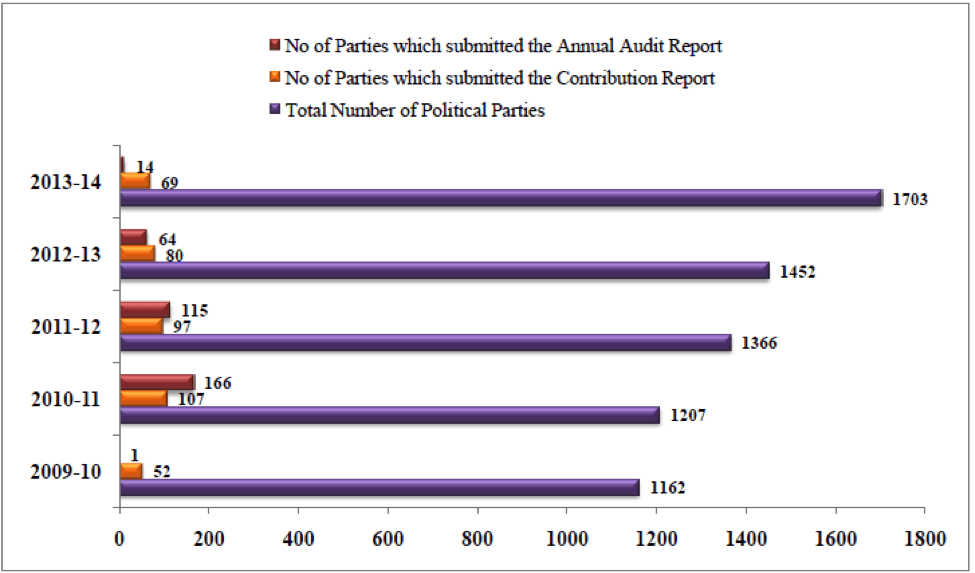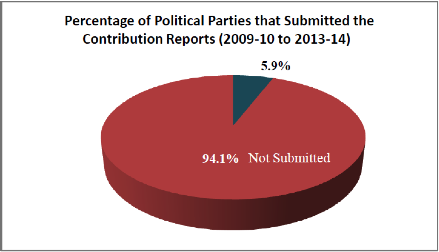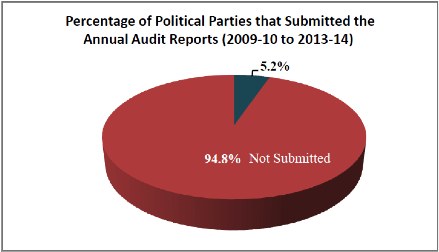In the previous article, we saw how there has been a phenomenal growth in the number of political parties in the last few years. In this article, we will focus on the financial reporting of the political parties.
[orc]Every political party registered under section 29A of the Representation of the People Act, 1951 (RPA) is supposed to submit two kinds of reports to the Election Commission of India (ECI) every year. According to section 29C of the RPA, political parties have to submit contribution reports as well as the annual audit report.
Contribution Report: The treasurer of a political party or any other person authorized by the political party should prepare a report each financial year with details of
- the contribution in excess of twenty thousand rupees (20,000) received from any person in that financial year;
- the contribution in excess of twenty thousand rupees (20,000) received from companies other than Government companies in that financial year.
Annual Audit Report: This is more like a balance sheet.
It is also to be noted that people or companies that donate to registered political parties also get income tax exemption to the extent of their donation. Section 80GGB of the Income Tax Act, 1961 (IT Act) relates to deductions in case of contribution from companies & Section 80GGC relates to deductions in case of contribution by individuals.
The status of submission of these reports from 2009-10 is compiled and this paints a very sad state of affairs. This data is as per the information available on the website of Election Commission of India (ECI) till date.
| Year | 2009-10 | 2010-11 | 2011-12 | 2012-13 | 2013-14 |
|---|---|---|---|---|---|
| Total Number of Political Parties | 1162 | 1207 | 1366 | 1452 | 1703 |
| No of Parties which submitted the Contribution Report | 52 | 107 | 97 | 80 | 69 |
| No of Parties which submitted the Annual Audit Report | 1 | 166 | 115 | 64 | 14 |
| Percentage of Parties (out of the total) which submitted the Contribution Report | 4.5% | 8.9% | 7.1% | 5.5% | 4.1% |
| Percentage of Parties (out of the total) which submitted the Annual Audit Report | 0.1% | 13.8% | 8.4% | 4.4% | 0.8% |
- For 2009-10, only 52 out of the 1162 parties submitted their contribution reports and worse only 1 party (Jantantra Party) submitted its Annual Audit Report.
- The best year in terms of the reporting was in 2010-11. For 2010-11, a total of 107 parties submitted their contribution reports and 166 parties submitted the annual audit reports.
- For 2011-12, the percentage of parties submitting the contribution reports again fell down with only 97 parties submitting the contribution reports while 115 parties submitting the Annual audit reports.
- For 2012-13, this number further fell down. All this while the number of political parties was increasing.
- For 2013-14, only 69 out of the 1703 parties submitted their contribution reports while a mere 14 parties submitted their annual audit reports.
From 2009-10 to 2013-14, only 5.9% of the parties submitted their Contribution Reports while an equally dismal 5.2% of the parties submitted their Annual Audit Reports.
With not even 10% of the parties submitting their contribution reports and annual audit reports to the ECI, the entire issue of political party funding becomes more important. The Central Information Commission’s decision that the six national parties are public authorities under the Right to Information Act (RTI) assumes greater significance.
The ECI on its part has issued a set of transparency guidelines in August 2014 to be followed by all political parties. The Law Commission of India, in its 255th report released recently also discussed the issue of election finance reform in detail.
We should all be demanding that political parties disclose their source of funding and mandatorily submit these reports. Transparency in political party funding should be the first step in the direction of major electoral reforms.
Data Source: Election Commission of India Website





